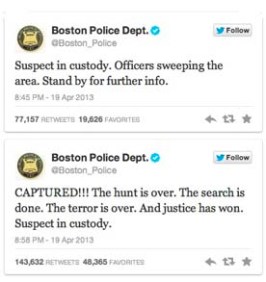The way in which people use social media has changed forever. Years ago, sites such as Facebook and Twitter were simply ways to stay in touch with old friends, family members, and the occasional ex-significant other. Recently, however, social media has started to make its mark on the major events in the world. People have used the tools, for better or for worse, in ways that completely changed the course in which some milestone moments developed.
Take the Boston massacre of 2013, for example. When the bombings occurred, one could find out information much quicker by checking Twitter than any news station on television, and that hunger for updates drove users to the internet. According to a Pew Research Center study, a quarter of Americans received news about the attack through social media. A separate study conducted by Hazards, Emergency Response, and Online Informal Communications found that the Boston Police Department had a 500 percent increase in followers, all of which were looking to track updates on the situation. One popular Twitter account that day- The Boston Fire Department’s- did not even post a single tweet and still saw a 25 percent spike in followers. Of course, this all was not without a hitch. There were some tweets sent out before any confirmation of information, leading many people to be misinformed of the situation, which shows how dangerous a tool like Twitter could be in these kinds of situations.
Photo courtesy of http://www.prsa.org/bin/l/i/boston.jpg
Social media also made a splash across the world. A 2011 revolution in Egypt saw thousands of Egyptians citizens to turn to social media in order to stay informed of and schedule their protests. One of the most important pages was called “We are all Khaled Said,” a page made in support of a beaten citizen. Today, the page has 3.8 million followers. While it no longer actively posts, the page carried on for more than two years after the protests began. Another page called “6th of April Youth Movement” originally was going to be used to simply organize a protest. It eventually grew into a page which today has over 600,000 likes and still regularly posts. Another Facebook event, highlighted by PBS, had almost 8,000 confirmed attendees. Through pages like these, people were able to broadcast their message not only in Egypt, but across the world. To some, Facebook and Twitter was used to solicit rebellion, but to others, it gave Egyptians a powerful voice in a time where government attempted to restrict their voice.
Photo courtesy of http://rwconnect.esomar.org/wp-content/uploads/2011/08/FB-Egypt.jpg
If the Boston bombing and Egyptian Revolution are any indication for what the future of social media holds, then the way in which users take in information will never be the same. Facebook and Twitter have created a mindset in which their users need to be at the forefront of information. That being said, there will also be people who want to be the first to break information, which may lead to false information being posted. Regardless, if properly used, social media will hold a major stake in the news cycle.

